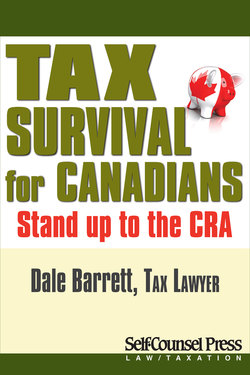Читать книгу Tax Survival for Canadians - Dale Barrett - Страница 36
На сайте Литреса книга снята с продажи.
5. Consequences of Not Filing
ОглавлениеI would say that besides avoiding being a criminal in the traditional sense by not killing somebody or not stealing a car for example, filing one’s tax returns is probably the best way of avoiding obtaining a criminal record. It is so easy. File your returns and don’t get a criminal record for failure to file. Unfortunately, many Canadian taxpayers simply do not get this subtle point.
Many people are scared to file because they know that they cannot afford to pay the taxes so they risk a criminal record by not filing. What they fail to realize is that not paying their taxes is not illegal; they cannot get a criminal record or be imprisoned for it. However, not filing their taxes is illegal.
The many consequences associated with unfiled or late-filed tax returns are unfortunate, and are likely to occur in most instances of late filing. In the case of unfiled returns, if taxes are payable, many CRA employees will automatically assume that the taxpayer is evading the payment of taxes by not filing his or her returns. Sometimes the CRA is right, and other times a taxpayer has every intention of paying, but gets in trouble nonetheless.
Typically, when the CRA discovers that a taxpayer has failed to a file return, it will send a letter requesting that the taxpayer file any outstanding returns. If the return is not filed by the deadline, employees at the CRA can decide to either arbitrarily assess the taxpayer (a process in which the CRA makes a guess at the tax owing — usually it is much more than the actual tax owing), in which case the taxpayer must either object or file his or her return to correct inconsistencies, or the CRA may issue a requirement to file a return. In this case, failure to produce the return can result in a referral to the Public Prosecution Service of Canada for charges, and a trip to court for a trial.
The CRA learns about failures to report income from a variety of sources including anonymous tips, information gathered from financial institutions, and other taxpayers during the course of an audit. The CRA has been known to find undisclosed earnings, such as finding information about third-parties or employees during an audit. This could include instances of bonuses being paid yet undisclosed, or other earnings that do not match between parties.
